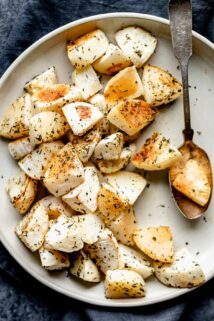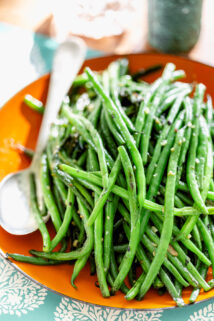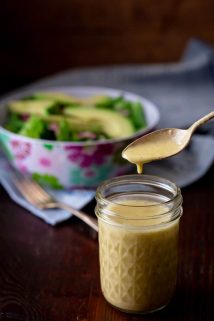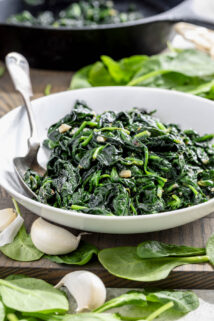Turnip Nutrition (Carbs, Calories & Health Benefits)
In today’s post, Registered Dietitian, Danielle Omar covers turnip nutrition and the health benefits of turnips. Turnips (Brassicarapa) are a common root vegetable that is relatively low in calories and carbohydrates. Find out more below.

The following nutritional information about turnips in this section about Nutrition was provided by RD Danielle Omar, Integrative Dietitian and creator of Nourish: 21 days of Clean eating. Find her at foodconfidence.com.
Table of contents
- Why are turnips good for you/ what do they do for the body?
- Are turnips high in carbs?
- How do they compare to a potato, nutrition-wise?
- What is their glycemic index/load?
- Are they a good choice for diabetics?
- Why do turnips cause gas?
- Are turnips low FODMAP?
- Can they cause constipation or diarrhea?
- What makes them taste bitter?
- Is the wax found on some turnips harmful and or bad for you?
Make sure to check out our Guide To Turnips for cooking with turnips, information on growing turnips, recipes and more!
Why are turnips good for you/ what do they do for the body?
Since turnips are cruciferous vegetables, they’re associated with cardiovascular health and cancer prevention thanks to their anti-inflammatory benefits.
They’re also rich in vitamin A, which is essential for healthy vision and immune health, vitamin C, an antioxidant that fights free radicals and promotes immune health, and vitamin K, which is essential for healthy blood clotting.
Turnips are high in fiber, making them filling and beneficial for digestive health, but lower in carbs than other root vegetables like potatoes.
Are turnips high in carbs?
Turnips aren’t especially high in carbs, especially compared to starchier root vegetables like potatoes, sweet potatoes, and parsnips. Turnips are mostly made of water – they’re 94% water, 5% carbohydrate, and 1% protein by weight. Their carbohydrate count is closer to that of their cruciferous veggie cousins like broccoli and kale. A cup of diced turnips has just about 8 grams of carbohydrates, while a cup of broccoli and kale each have 6 grams of carbs.
How do they compare to a potato, nutrition-wise?
Turnips have fewer calories than potatoes, with just about 36 calories per cup versus a little over 100 calories per cup of diced potatoes.
Both turnips and potatoes have similar amounts of fiber and vitamin C per cup, but potatoes’ total carb count comes in at about 24 grams per cup, compared to turnips’ 8 grams of carbs per cup.
Potatoes are higher in potassium, however, supplying about 20% of your daily needs per cup, while turnips only provide about 12% per cup.
What is their glycemic index/load?
Turnips have a glycemic index of 62, which is considered moderately glycemic. Pairing them with sources of protein can help reduce their glycemic impact to prevent quick blood sugar spikes.
Are they a good choice for diabetics?
Eating too many turnips without sources of protein and fat to slow down carbohydrate absorption can lead to poor control of diabetes. However, diabetics don’t necessarily need to avoid turnips.
They’re high in fiber, vitamins, and minerals, and can be a great low-carbohydrate alternative to potatoes.
The glycemic load of potatoes ranges between 80-110, falling in the “high” range in which carbohydrates are released quickly into the bloodstream. Turnips’ lower glycemic load makes them a better choice for diabetics, in moderation.
Why do turnips cause gas?
Turnips are a member of the cruciferous vegetable family (alongside cauliflower, broccoli, cabbage, and more).
Cruciferous veggies contain an oligosaccharide called raffinose, which our digestive systems cannot break down.
That means raffinose makes it to the large intestine undigested, where bacteria ferment the raffinose and creates a byproduct of gas.
Are turnips low FODMAP?
Yes, turnips are considered low FODMAP, meaning they’re low in certain fermentable carbohydrates that may contribute to digestive distress.
Even though turnips contain raffinose and may produce gas, they don’t contain high levels of the fermentable carbohydrates typically known to worsen symptoms of conditions like Irritable Bowel Syndrome, Crohn’s Disease, and Colitis.
Can they cause constipation or diarrhea?
Vegetables high in fiber tend to help regulate bowel movements, rather than cause distress like constipation or diarrhea. There’s no evidence that turnips cause constipation or diarrhea, and they might actually help!
What makes them taste bitter?
Turnips that are harvested while young have a sweet and mild flavor, without any bitterness. As they continue to grow or age, they can become bitter and end up with a woody texture.
The bitterness is caused by compounds called glucosinolates, which taste spicy or bitter to some people. If you’re not a fan of bitterness, look for smaller turnips with greens that are fresh and brightly colored. That means they were picked while young and haven’t been sitting around long enough to turn bitter!
Pairing bitter foods with sweet or sour taste can help to balance the bitterness. Try our roasted turnips with balsamic vinegar.
Is the wax found on some turnips harmful and or bad for you?
Most of the time turnips aren’t coated in wax – “wax turnips” are actually rutabagas!
The thin layer of wax on the outside traps moisture to keep fruits and vegetables from drying out. While it’s food-grade wax, which is cleared as non-toxic, note that it’s recommended that you wash and peel turnips and rutabagas before eating to avoid the wax altogether.





















I’ve only had turnips a few times but this post convinced me to make them more often. Thanks for the info!
New to using this in cooking. Info was helpful in understanding ways to use it, thanks.
So glad it was useful, Justine!
Oh wow. I love turnips, and I knew they were good for me. I didn’t know they were THAT good for me, though!
Turnips are amazing, aren’t they!?
I actually love turnips, and in the Middle East we do a great lemony stuffed turnip dish. Good to know they are so healthy! Thanks for sharing!
That lemony stuffed turnip dish sounds incredible! Thanks for sharing that with us, Farah!
This is such a helpful guide to all things related to turnips!! I had no idea turnips had so much nutrition, and that they were also a low carb alternative to potatoes!
We’re glad our turnip guide taught you something new! 🙂
The information in this excellent recipe is incredibly helpful. I think your post was the greatest I read today.